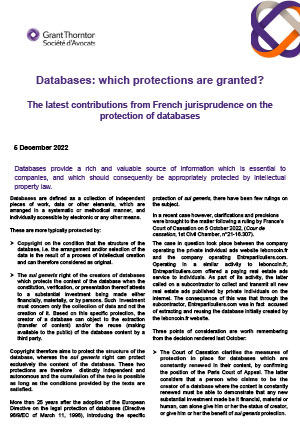Databases provide a rich and valuable source of information which is essential to companies, and which should consequently be appropriately protected by intellectual property law.
Databases are defined as a collection of independent pieces of work, data or other elements, which are arranged in a systematic or methodical manner, and individually accessible by electronic or any other means.
These are more typically protected by:
- Copyright on the condition that the structure of the database, i.e. the arrangement and/or selection of the data is the result of a process of intellectual creation and can therefore considered as original.
- The sui generis right of the creators of databases which protects the content of the database when the constitution, verification, or presentation thereof attests to a substantial investment being made either financially, materially, or by persons. Such investment must concern only the collection of data and not the creation of it. Based on this specific protection, the creator of a database can object to the extraction (transfer of content) and/or the reuse (making available to the public) of the database content by a third party.
To read the rest of this alert, please download the PDF below.

























